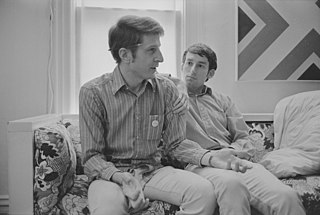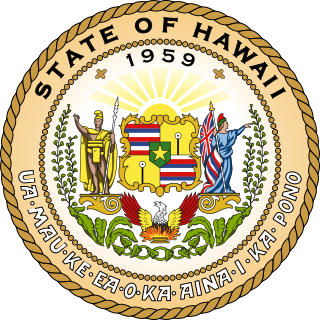Related Research Articles

The availability of legally recognized same-sex marriage in the United States expanded from one state (Massachusetts) in 2004 to all fifty states in 2015 through various court rulings,state legislation,and direct popular votes. States each have separate marriage laws,which must adhere to rulings by the Supreme Court of the United States that recognize marriage as a fundamental right guaranteed by both the Due Process Clause and the Equal Protection Clause of the Fourteenth Amendment to the United States Constitution,as first established in the 1967 landmark civil rights case of Loving v. Virginia.
This is a list of notable events in the history of LGBT rights that took place in the year 1996.
This is a list of notable events in the history of LGBT rights that took place in the year 1999.
Ronald T. Y. Moon was the Chief Justice of the Hawaii State Supreme Court in Honolulu,Hawaii. He served his first term from 1993 to 2003,and his second term from 2003 until retiring in August 2010. Moon studied at Coe College towards bachelor's degrees in psychology and sociology. He went on to the University of Iowa College of Law,where he obtained his Juris Doctor. He returned to Honolulu in 1965 and became law clerk to United States District Court Judge Martin Pence. He served under Pence for a year. In 1966,Moon joined the staff of the Prosecuting Attorney of Honolulu where he was deputy prosecutor until 1968. He left public service to become a partner in the law firm Libkuman,Ventura,Moon and Ayabe where he stayed until 1982. It was from the law firm that Governor George Ariyoshi appointed Moon to the Hawaii State Judiciary as a circuit court judge. Governor John Waihee then elevated Moon to the office of Associate Justice of the Hawaii State Supreme Court in 1990. In 1993,Moon was once again elevated to become chief justice. He retired on August 31,2010.
Steven H. Levinson is a former Associate Justice of the Supreme Court of Hawaii. Levinson served his first term from 1992 to 2002 and was retained by the Judicial Selection Commission to serve a second ten-year term. He retired from the court,effective December 31,2008.

Prior to the Supreme Court's decision in Obergefell v. Hodges (2015),U.S. state constitutional amendments banning same-sex unions of several different types passed,banning legal recognition of same-sex unions in U.S. state constitutions,referred to by proponents as "defense of marriage amendments" or "marriage protection amendments." These state amendments are different from the proposed Federal Marriage Amendment,which would ban same-sex marriage in every U.S. state,and Section 2 of the Defense of Marriage Act,more commonly known as DOMA,which allowed the states not to recognize same-sex marriages from other states. The amendments define marriage as a union between one man and one woman and prevent civil unions or same-sex marriages from being legalized,though some of the amendments bar only the latter. The Obergefell decision in June 2015 invalidated these state constitutional amendments insofar as they prevented same-sex couples from marrying,even though the actual text of these amendments remain written into the state constitutions.

Evan Wolfson is an attorney and gay rights advocate. He is the founder of Freedom to Marry,a group favoring same-sex marriage in the United States,serving as president until its 2015 victory and subsequent wind-down. Wolfson authored the book Why Marriage Matters:America,Equality,and Gay People's Right to Marry,which Time Out New York magazine called,"Perhaps the most important gay-marriage primer ever written". He was listed as one of Time magazine's 100 most influential people in the world. He has taught as an adjunct professor at Columbia Law School,Rutgers Law School,and Whittier Law School and argued before the Supreme Court in Boy Scouts of America v. Dale. He now teaches law and social change at Georgetown Law School and at Yale University;serves as a senior counsel at Dentons,the world's largest law firm;and primarily provides advice and assistance to other organizations and causes,in the United States and globally,that are seeking to adapt the lessons on "how to win" from the same-sex marriage movement.

Constitutional Amendment 2 of 1998 amended the Constitution of Hawaii,granting the state legislature the power to prevent same-sex marriage from being conducted or recognized in Hawaii. Amendment 2 was the first constitutional amendment adopted in the United States that specifically targeted same-sex partnerships.

Same-sex marriage has been legal in Hawaii since December 2,2013. The Hawaii State Legislature held a special session beginning on October 28,2013,and passed the Hawaii Marriage Equality Act legalizing same-sex marriage. Governor Neil Abercrombie signed the legislation on November 13,and same-sex couples began marrying on December 2. Hawaii also allows both same-sex and opposite-sex couples to formalize their relationships legally in the form of civil unions and reciprocal beneficiary relationships. Civil unions provide the same rights,benefits,and obligations of marriage at the state level,while reciprocal beneficiary relationships provide a more limited set of rights.
Same-sex unions in the United States are available in various forms in all states and territories,except American Samoa. All states have legal same-sex marriage,while others have the options of civil unions,domestic partnerships,or reciprocal beneficiary relationships. The federal government only recognizes marriage and no other legal union for same-sex couples.

Baehr v. Miike was a lawsuit in which three same-sex couples argued that Hawaii's prohibition of same-sex marriage violated the state constitution. Initiated in 1990,as the case moved through the state courts,the passage of an amendment to the state constitution in 1998 led to the dismissal of the case in 1999. The Full Faith and Credit Clause of the Constitution would have provided that all states would be potentially required to recognize marriages obtained in Hawaii,prompting the passage of the federal Defense of Marriage Act (DOMA) in 1996 under Bill Clinton. Dozens of statutes and constitutional amendments banning same-sex unions at the state level also followed Baehr.
Same-sex marriage has been legally recognized in Alaska since October 12,2014,with an interruption from October 15 to 17 while state officials sought without success to delay the implementation of a federal court ruling. The U.S. District Court for the District of Alaska held on October 12 in the case of Hamby v. Parnell that Alaska's statutory and constitutional bans on same-sex marriage violated the Due Process and Equal Protection clauses of the U.S. Constitution. On October 15,state officials obtained a two-day stay from the Ninth Circuit Court of Appeals,which the U.S. Supreme Court refused to extend on October 17. Although Alaska is one of a few states which enforces a three-day waiting period between requesting a marriage license and conducting a marriage ceremony,at least one same-sex couple had the waiting period waived immediately after the district court's ruling. They married in Utqiagvik on October 13 and were the first same-sex couple to marry in Alaska.

In Hawaii,the LGBT laws have been evolving for the past hundred years. In the pre-19th century,the influence of Polynesian culture led to a more open-minded state. After the first Christian missionaries began arriving in Hawaii,strict sodomy laws were enacted. Territory v. Bell (1958) was the last sodomy case argued in Hawaii. After the turn of the 20th century,LGBT issues began being taken to and decided by the Supreme Court. In 2013,Hawaii voted in favor of gay marriage,and marriage licenses began to be issued to LGBT couples.
This article contains a timeline of significant events regarding same-sex marriage in the United States. On June 26,2015,the landmark US Supreme Court decision in Obergefell v. Hodges effectively ended restrictions on same-sex marriage in the United States.
Same-sex marriage has been legal in Kentucky since the U.S. Supreme Court's ruling in Obergefell v. Hodges on June 26,2015. The decision,which struck down Kentucky's statutory and constitutional bans on same-sex marriages,was handed down on June 26,2015,and Governor Steve Beshear and Attorney General Jack Conway announced almost immediately that the court's order would be implemented.
Same-sex marriage has been legal in Arkansas since the U.S. Supreme Court's landmark decision in Obergefell v. Hodges on June 26,2015,in which the court struck down same-sex marriage bans nationwide. Prior to this,same-sex marriage in Arkansas was briefly legal for a period beginning on May 9,2014,as a result of a ruling by Sixth Judicial Circuit Judge Chris Piazza striking down the state's constitutional and statutory bans on same-sex marriage as violating the U.S. Constitution. Approximately 541 same-sex couples received marriage licenses in several counties before the Arkansas Supreme Court stayed his ruling pending appeal on May 16,2014.
Obergefell v. Hodges,576 U.S. 644 (2015),is a landmark decision of the Supreme Court of the United States which ruled that the fundamental right to marry is guaranteed to same-sex couples by both the Due Process Clause and the Equal Protection Clause of the Fourteenth Amendment of the Constitution. The 5–4 ruling requires all fifty states,the District of Columbia,and the Insular Areas to perform and recognize the marriages of same-sex couples on the same terms and conditions as the marriages of opposite-sex couples,with all the accompanying rights and responsibilities. Prior to Obergefell,same-sex marriage had already been established by statute,court ruling,or voter initiative in thirty-six states,the District of Columbia,and Guam.
In the United States,the history of same-sex marriage dates from the early 1940s,when the first lawsuits seeking legal recognition of same-sex relationships brought the question of civil marriage rights and benefits for same-sex couples to public attention though they proved unsuccessful. However marriage wasn't a request for the LGBTQ movement until the Second National March on Washington for Lesbian and Gay Rights in Washington (1987). The subject became increasingly prominent in U.S. politics following the 1993 Hawaii Supreme Court decision in Baehr v. Miike that suggested the possibility that the state's prohibition might be unconstitutional. That decision was met by actions at both the federal and state level to restrict marriage to male-female couples,notably the enactment at the federal level of the Defense of Marriage Act.

James Obergefell is an American civil rights activist who was the lead plaintiff in the 2015 U.S. Supreme Court case Obergefell v. Hodges,which legalized same-sex marriage throughout the United States. Obergefell had sued the state of Ohio in 2013,due to that state's lack of legal recognition of Obergefell's marriage to his husband,John Arthur. Obergefell was the Democratic nominee for the 89th legislative district of the Ohio House of Representatives in the 2022 elections.

William Everett Woods was an American gay rights activist. He advocated for better treatment of gay people through his political organizing and public commentary. In 1990,he took three same-sex couples to fill out marriage licenses,beginning the series of events that would lead to the legalization of same-sex marriage in the United States.
References
- 1 2 "JUDGE DANIEL R. FOLEY (Ret.)" (PDF). hawaii.gov. State of Hawaii Department of Labor and Industrial Relations. October 15, 2020. Retrieved December 29, 2022.
- ↑ Kua, Crystal (August 5, 2000). "Senate confirms Foley, 3 other judges". starbulletin.com. Honolulu Star-Bulletin. Retrieved December 29, 2022.
- 1 2 Foley, Daniel (December 1, 2022). "Reflections On The Respect For Marriage Act". Honolulu Civil Beat. Retrieved December 29, 2022.
- 1 2 Pinello, Daniel R. (2006). America's Struggle for Same-Sex Marriage . Cambridge University Press. pp. 25–7. ISBN 978-0521848565.
- 1 2 3 "New Part-Time Associate Justice of the Puiau Supreme Court" (PDF). Judiciary Branch of the Republic of Palau. Supreme Court of the Republic of Palau. November 30, 2011. Retrieved December 29, 2022.
- ↑ "Associate Judge Daniel Foley Receives HSBA's 2016 Ki'e Ki'e Award". Hawai'i State Judiciary. November 7, 2016. Retrieved December 29, 2022.
- ↑ Issenberg, Sasha (May 31, 2021). "The Surprising Honolulu Origins of the National Fight Over Same-Sex Marriage". POLITICO . Retrieved June 4, 2021.
- ↑ Kennedy, Anthony (June 26, 2015). "Obergefell v. Hodges". Legal Information Institute. Cornell University. Retrieved December 29, 2022.
- 1 2 Foley, Daniel (March 30, 2018). "Campaign Corner: Kim Coco Iwamoto The Only True Progressive LG Candidate". Honolulu Civil Beat. Retrieved December 29, 2022.